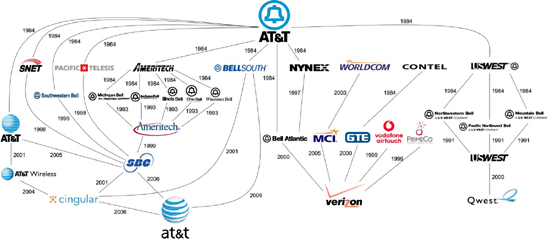What makes a working economy?
The “free market” is one of the most powerful frames conservatives use to advance their agenda. How many times have you heard the phrase “leave it to the market” or “let the market do its work”? This argument has been applied to everything from the breakup of AT&T to social security to just about every argument conservatives have about fighting “big government”.
The reason this argument is so effective is that most people can clearly see how the “free market” has brought many good things into their lives. The idea of a “win, win” situation is understood from daily transactions. When markets function properly, people often benefit.
The issue is that certain conditions are necessary to maintain this functioning “free market”. The Rockridge Institute has one of the best summations I’ve seen of the underlying assumptions of working markets.
These conditions are:
- Assumption 1: There is near-perfect competition.
- Assumption 2: There is perfect knowledge by both buyers and sellers.
- Assumption 3: There is equal accessibility.
- Assumption 4: There is no organizing of sellers to inflate prices.
- Assumption 5: Both buyer and seller are equally powerful.
- Assumption 6: Both buyers and sellers act rationally.
Corporations understand this and they also understand that the way to much higher profits is to shift the balance of power away from these conditions. That is, to make the markets less free.
For example, to eliminate competition corporations look for markets where they can sign exclusivity contracts. The best example of this is to think about buying a beer or a soda at a sports event. Why does it cost so much? Because companies can negotiate for limited monopolies within a stadium where there is no competition and vendors can charge much higher prices.
Another excellent example are the fees that telephone and cable companies attach to their bills. These fees are so confusing that it is almost impossible for the buyer to obtain good information and to compare with other offerings. In this situation, the seller can make more money because the buyer does not have sufficient knowledge to even be able to argue the cost. Bob Sullivan writes about many of these “hidden costs” over at the Red Tape Chronicles and in his new book Gotcha Capitalism.
It is in most corporations’ best interests to undermine these assumptions of the “free market” while at the same time using this concept of a free market to push for their agenda.
Here’s the irony: the argument for free markets is used most to argue for issues that benefit big corporations. It is not used consistently. Look at all of the no-bid contracts companies such as Halliburton, Fluor Corporation and Bechtel National have received from the government.
Progressives miss a HUGE opportunity to explain their values in terms of these market assumptions. We should be arguing that the role of government is to help establish working markets. The role of government when it comes to a working economy should be to ensure:
- Equality of the marketplace – citizen rights should be on an equal basis with large corporations
- Competition – government should have the power to break up monopolies
- Standards – quality and safety regulations
- Fairness of information – you have the right to know about the fine print
Conservatives argue against regulations and big government, but if this argument is made universally you throw out the baby with the bathwater. Think about all of the recent toy recalls this past year. The role of government should be to help ensure that products that are sold in the U.S. adhere to safety standards. Without fair regulations, power tilts towards large businesses who can take advantage of the system to profit by selling unsafe toys. The idea that corporations will somehow “police themselves” and do the right thing has been proven wrong time and time again by companies such as Enron and Marsh & McLennan.
One of the roles of our government should be to help make sure the free market works for everyone. This is what progressives should be fighting for and how we should be framing the economic debate.
—
 |
David Akadjian is the author of The Little Book of Revolution: A Distributive Strategy for Democracy. Follow @akadjian |











